
“Your husband brought us together several years ago to try and help in his research. He and Frank found evidence that the ancient Egyptians had discovered a secret method of giving life to inanimate figurines—a secret passed on to a select few who knew and practised magic…”
[aka Puppetmaster aka Puppet Master I]
Director: David Schmoeller
Starring: Paul Le Mat, Jimmie F. Skaggs, Irene Miracle, Robin Frates, Matt Roe, Kathryn O’Reilly, Merrya Small, William Hickey
Screenplay: Joseph G. Collodi (David Schmoeller), based upon a story by Charles Band and Kenneth J. Hall
Synopsis: In 1939, at the Bodega Bay Inn in California, puppet master Andre Toulon (William Hickey) is putting the finishing touches on one of his creations – puppets that can move without strings – when he becomes aware that two men are searching for him. Toulon gathers together his puppets, hiding them in a trunk that he conceals behind a panel in the wall of his hotel room. As the men in black reach the door of his room, Toulon shoots himself… Fifty years later, anthropology professor Alex Whitaker (Paul Le Mat) jerks awake from a dream of a man and a woman dancing in an empty ballroom. The man pulls a gun on the woman… In the middle of a reading, fortune-teller Dana Hadley (Irene Miracle) clutches her head as she suffers a sudden vision… While conducting an experiment, psychic researcher Frank Forrester (Matt Roe) and his subject and girlfriend, Carissa Stamford (Kathryn O’Reilly), receive a phone-call from Alex regarding his dream. Frank replies that he and Carissa have also been “contacted”, and tells him of Dana’s vision. They decide that it can mean only one thing: that their former associate, Neil Gallagher (Jimmie F. Skaggs), has found Andre Toulon’s secret. Guided by Dana, the four head for the Bodega Bay Inn. To their surprise, they are greeted by a Mrs Gallagher, Megan (Robin Frates). They ask to see her husband, and are stunned when Megan tells them that he is dead; that he shot himself. When the visitors are alone, Forrester puzzles over how none of them picked up on Gallagher’s death, and concludes that Gallagher had somehow “blocked” them; suggesting that he had indeed located Toulon’s secret. Megan’s assistant at the hotel, Theresa (Merrya Small), shows Dana to her room. Dana warns Theresa that she is in danger, and tells her to stay away from the fireplace. Alex finds a postcard featuring the hotel’s ballroom, and has another vision of the man and woman dancing: they are Neil and Megan Gallagher. That evening, something climbs out of Gallagher’s coffin: a stringless puppet with a pinhead and enormous hands… Over dinner, Dana needles Megan about her marriage until the widow flees the table. Alex goes after her to apologise. When the bewildered Megan demands to know what is going on, Alex explains that the four of them have psychic powers, and that they were once employed by Neil Gallagher. He further explains that Gallagher and Frank researched the occult powers of the Egyptians who, they believed, had developed a method of instilling life into inanimate figurines; a secret passed down through the ages to a few select alchemists, the last of whom was Andre Toulon. Meanwhile, as Theresa stokes the fire, a poker is swung savagely at her head… Later, Megan screams hysterically and faints. The others rush to her, and find Neil Gallagher sitting in an armchair in the lounge…
Comments: I guess this is a slightly embarrassing admission for someone in my position to be making, but the truth is, I’m not all that well-versed in the world of Full Moon. Lately, I’ve been trying to rectify the situation by watching a representative selection of the company’s output; and I’ve come away from the exercise with an overwhelming – or should that be underwhelming? – sense that the distinguishing feature of their films is their tendency to be all dressed up with nowhere to go. Time and again, an incredibly convoluted backstory and enough plot threads to feed half a dozen movies are thrown together, only to have it turn out that these elements have little if anything to do with the actual scenario.
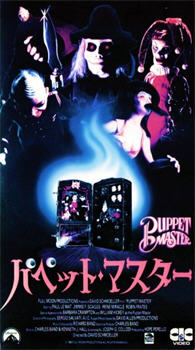
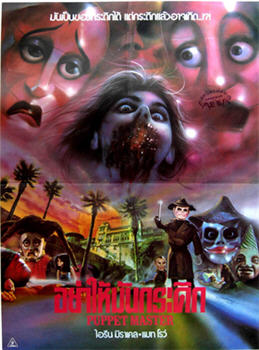

Puppet Master, the film upon which Charles Band built his, uh, empire (sorry!), is a case in point, serving up an opening hodge-podge of psychics, alchemists, Nazi agents, free-range puppets and the living dead, then degenerating into a plot which, by and large, seems to have been lifted from a slasher movie; only with several little killers instead of one big one. Even more disheartening is the fact that, in spite of this amazing mixture of subject matters (which you’d really think would provide sufficient material to fill out an eighty-five minute movie, four minutes of which are the credits, by the way), Puppet Master features a simply astonishing amount of padding. Far too often, the viewer is reduced to staring at the screen in a state of annoyance and/or impatience, as events with clearly no other purpose than to stretch out the film take their own sweet time about unfolding.
In fact, Puppet Master makes the near-fatal error of starting out with just such a sequence, in which something makes its way through the grounds of the Bodega Bay Inn, goes inside, weaves across the crowded lobby, then runs into an occupied elevator, down a corridor and into an hotel room, all without being seen until the very last moment. This chain of events drags on for over five minutes, all of it shown POV; and as if this in itself weren’t bad enough, the “something” is then revealed to be a foot-high, skull-faced, knife-wielding puppet—making its unnoticed journey through the hotel not just irritating, but ludicrous.
(I’m always amazed at how few fantasy film makers seem to understand the first principle of suspension of disbelief: if you want your audience to accept the “big impossibles”, then you’d darn well better get the “little possibles” right.)
But even all the overt padding isn’t the worst of it. I’ve seen few films that could challenge Puppet Master in its dispiriting use of—well, covert padding. I’ve now watched this film twice in fairly rapid succession, and under these conditions it is impossible not to notice that in spite of all the questions raised during the dialogue scenes in the first half of the film (and there are a lot of them), not one of those questions is ever answered.


We get endless hints about the character of Neil Gallagher; about his relationship with the other characters, including his wife; about the secret of Andre Toulon; and then all of this is just swept to one side and forgotten, having served its purpose and kept the audience dangling until the time for puppet mayhem finally arrived.
Still more incredibly, it turns out that the psychic abilities of the four central characters play no real part in the way the plot is worked out either, beyond providing a few visual flourishes and other bits of business along the way. Frankly, had the four been Neil Gallagher’s former accountants, whom he summoned by telegram, it wouldn’t have made a lick of difference to the outcome of the story.
And yes, certainly some of this is set up for the inevitable sequels, and does (I gather) become relevant then; but it would have been nice if the film-makers given more of their attention to the film they were making at the time…
None of which is to say I hated Puppet Master. I didn’t; in fact, I kind of liked it in spite of all its faults; or at least, liked it enough to be disappointed in it, and to wish it were better. Of course, the puppets themselves give the film a headstart into my good graces. Films about “little scuttling things” work on me; always have done, ever since I was traumatised at the age of ten by a late-night viewing of Trilogy Of Terror.
(Although, truth be told, it wasn’t the film alone that traumatised me, but— Oh, well, no sense in opening up old wounds. Aren’t older sisters wonderful, though?)


These particular “scuttlers” are far and away the most interesting thing about this film. Our little stars are five in number. Jester is the puppets’ ostensible leader, inasmuch as he sits back and lets the others do his dirty work for him; his big trick is spinning the three segments of his head around in order to change expression. There’s also Blade, our acquaintance of the opening sequence, who has a knife for one hand, and a hook for the other; Tunneler, who looks just like the racially-dubious Bad Guy from Thunderbirds, except that he has a cone-shaped drill on the top of his head; and Pinhead, he of the tiny head and huge hands, much given to tossing people around and trying to strangle them.
(I had a problem seeing Pinhead as a figure of menace, not merely because of his blithe disregard of the laws of physics, but because every time I looked at his hands, I was irresistibly reminded of Wallace And Gromit.)
And finally, there’s Leech Woman, the Smurfette of the group, who has the, shall we say, unlikely ability to hock up deadly leeches onto her victims; provided, that is, that those victims are tied to a bed or otherwise incapacitated: she ain’t exactly lightning fast at it.
(While the official Puppet Rollcall ends here, I can’t help wondering what happened to the little guy who was looking out of the hotel window in the opening scene?)
The main pleasure of Puppet Master is the way its miniature anti-heroes are realised: this was the work of a team headed by David Allen, and is achieved (Pinhead’s hands, which are real, aside) via a combination of stop-motion animation and genuine puppetry—and pretty skilful puppetry, at that. In fact, this alone is almost enough to lift the film above its quagmire of a screenplay, easing the strain on the audience’s overburdened suspension of disbelief, and infusing each of the puppets with a genuine personality. Alas! – if only as much could be said about the human members of the cast.

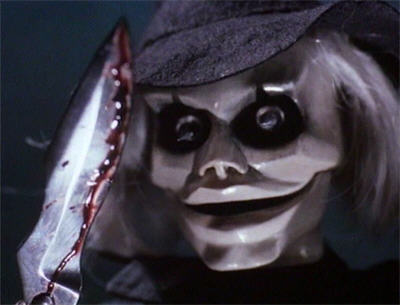
The opening moments of Puppet Master immediately offer a wink at the viewer, establishing its setting as the “Bodega Bay Inn”. The exteriors were filmed at Castle Green in Pasadena; the single shot of the cliff-top hotel overlooking the bay quickly becomes to this franchise what that night-time shot of The House is to the Amityville franchise. These shots are accompanied by Richard Band’s calliope-music-infused score, which would also become a franchise motif.
The tiresomely protracted POV sequence follows, with Blade (we eventually learn) trying to get back to the room of his creator, Andre Toulon, in time to warn him that two Nazi agents have tracked him down. Another of the puppets (the one never seen again) has already spotted them through the window, however, and Toulon goes calmly on with his task of securing the puppets in their travelling trunk, which he further hides behind a panel in the wall, along with a scroll covered with Egyptian hieroglyphics. As the two Nazis (who are identically dressed in trench-coats, fedoras and black gloves, fondling their guns almost openly, and doing pretty much everything they can to draw attention to themselves) break in through his locked door, Toulon blows his own brains out…
The narrative then skips forward some fifty years, and introduces us to our human characters—sigh. The four are referred to broadly as “psychics”, although each of them has unique and specific abilities. For Alex Whitaker, Professor of Anthropology at Yale (!), this is the ability to see the future through his dreams—which the film keeps using as an excuse to spring the dream-within-a-dream schtick. Alex is introduced this way, jerking from a dream about a man threatening to shoot a woman into another wherein he is being drained by leeches. Though Paul Le Mat is top-billed here, his Alex is the least interesting of the four psychics, which makes his continued survival through the various threats that manifest themselves, even as his colleagues are picked off one by one, rather exasperating—although I guess we could interpret that (and not unjustly) as him posing the least threat to the film’s villain. But while some of his dreams (or visions: the film vacillates on this point) are visually interesting, ultimately it is less Alex Whitaker’s ability to see into the future that saves him so much as his amazing ability to take repeated punches and kicks to the face.


Things pick up with the introduction of Dana Hadley, aka “The White Witch”, who combines a genuine psychic ability with the use of charms and spells. Dana is by far the most engaging of the four, thanks to the performance of Irene Miracle. All of this film’s human characters are underwritten, but Miracle succeeds in fleshing out Dana, not so much through her dialogue (though she does get the best lines, delivered in a thick-as-mo-lasses Southern accent) as by latching on to the paraphernalia of her profession: alone of the four, with Dana you get a sense of the powers they’re all supposed to have—not that they do her much good in the long run. Nevertheless, whenever she is in a scene there is usually something interesting going on, from her wielding of a chicken’s foot to her peculiar relationship with a stuffed Pekingese she calls “Leroy”.
(Dana’s introductory scene, which finds her at her day-job of carnival fortune-teller, also contains a “special guest appearance” by Barbara Crampton, who appears as a gullible customer: we gather that Dana doesn’t waste her talents on the likes of her.)
The other two members of the quartet are Frank Forrester and Carissa Stamford: a pair of psychic researchers who make Peter Venkman look legitimate. Although Frank, like the others, is supposed to have “unusual psychic abilities”, he refers to himself rather as a “researcher” and to Carissa as his “principal psychometric subject”. Here we see him tapping into the sexual fantasies of a volunteer using a machine with a lot of knobs and dials, which beeps and flashes a lot; while later we will find him channelling and monitoring Carissa’s inherent powers.
However, the two of them together apparently do have psychic flashes during sex (or while “conducting an experiment”, as they prefer to call it). Her specialty being psychometry, Carissa spends much of her time reacting to her surroundings: she specialises in beds and bathtubs, with obvious side-effects. As should be clear from this description, Kathryn O’Reilly’s role here is partly comic relief (alleged), and partly to offer a little skin.


In the middle of a reading, Dana has a painful psychic experience: painful both physically and in its content, in which she sees herself being pursued by someone—or something—wielding a knife… Frank and Carissa then get a phone-call from Alex about his own dream; Frank tells him that they too have been “contacted”, and since all of them have, in his opinion this means that Gallagher has located the puppet master’s hiding-place, and now wants to meet with them. Franks adds that he and Carissa have also heard from Dana, whose vision revealed their destination as the Bodega Bay Inn…
The four are surprised to be greeted by a Mrs Gallagher, and stunned to hear that Neil Gallagher has shot himself. Megan tells them that she doesn’t know why her husband killed himself; that while he did leave a note, it said only that he did not want to be buried until his “friends” had arrived. Dana, taking nothing for granted, waits only until the widow has turned her back to make sure by driving a long bodkin into the corpse. She and Frank then debate why, during their respective “contacts”, they didn’t pick up on the fact that Neil was dead.
The guests having agreed to stay for the funeral, they are shown to their rooms. Alex starts making puppy-dog eyes at Megan, before experiencing a vision of her and Neil dancing in a huge white ballroom, and hearing Neil’s voice say, “You can’t save her…” Dana agitates the housekeeper, Theresa, by trying to “purify her spirit body” and warning her to stay away from the fireplace; while Carissa has a vision of Neil Gallagher raping a woman, not his wife, in the elevator—followed by a less unpleasant vision of Clark Gable and Carole Lombard, who once had sex in the bed in her room.
(Okay. I know I’ve said this before, but I’m going to say it again: there are few things I despise more intensely than rape scenes which exist simply as an excuse for nudity. Frankly, anyone who hasn’t got enough imagination to figure out how to get some boobs into their film without resorting to staging a rape probably shouldn’t be making fantasy films. Also, it isn’t women who generally use the euphemism, “Forcing her to have sex.”)

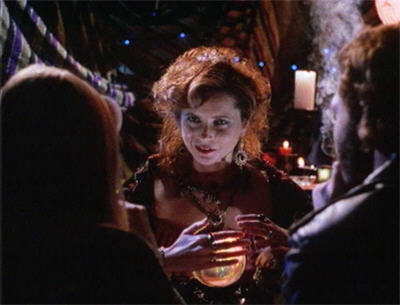
While very little of this turns out to be relevant later, Puppet Master’s worst stretch of padding is the dinner scene that follows. It is made somewhat palatable by giving the bulk of the time-wasting to Dana, who is at least fun to listen to as she torments Megan with suggestions that she was married for her money, and makes dark allusions to Neil having “screwed us all” and the four of them having come to “even the score”; but it is impossible not to notice that nothing of what she raises here is ever resolved.
(On the other hand, Dana gets one of the film’s best moments here, when she objects to Frank calling her a cynic: “I prefer to think of myself as a nasty bitch.”)
It is quite a relief when these two sequences of dead-space are punctuated by the first reappearance of one of the puppets, with Pinhead climbing out of Neil Gallagher’s coffin…
Dana finally goads Megan into fleeing the dining-room. Alex goes after her, explaining to her their various powers, and how and why they got involved with Neil, who was searching for the ancient Egyptian method of giving life to inanimate objects—a secret passed down to only a very few, the last being Andre Toulon, “a famous puppet master of the twenties”, who Neil identified with help from Dana.
And then—finally—it is time for a little of the promised puppet mayhem, when Theresa ignores Dana’s warning to stay away from the fireplace; and although this sequence too is unnecessarily drawn out—hear a noise, look around, investigate, nothing there, hear a noise, look around, investigate, nothing there—it does at last end with Theresa taking a poker to the skull, courtesy of Pinhead.
All the guests are then brought rushing to the lounge when Megan screams and faints. Alex points out the cause to the others: Neil Gallagher, sitting at ease in an armchair, albeit still definitely dead…


While the others return the wandering corpse to its coffin, and debate why Neil would have shot himself if he found Andre Toulon’s secret, Alex stays with Megan, telling her that for his part, he came to the inn to make sure that one of his dreams didn’t come true. He does not explain that this was a dream of Neil Gallagher killing a woman he now knows was Megan.
That night, Frank and Carissa conduct one of their “experiments”, much to the dismay of everyone else within earshot (for such a fancy hotel, the Bodega Bay Inn has mighty thin walls), using “various sexual aids and certain assorted apparatus”, in order to “open up a channel to Neil Gallagher”—although given Gallagher’s refusal to stay in his coffin, this seems rather like an act of supererogation.
Alex has already caught Dana casting spells of protection outside everyone’s rooms. Though he seems not to take seriously her insistence that they’re all in danger, he follows the instructions he finds pinned to his own door and lights a human-shaped candle left for him—just before the POV drops to near-floor level. Another exasperating “I can’t see the obvious” sequence follows, as someone—Blade, we later find out—manages to follow Alex across the room, make a knocking noise so that he opens his door, and slip out into the corridor, all without being seen.
(These scenes would be a lot easier to take without the heavy breathing on the soundtrack.)
It is Frank and Carissa who get the dubious honour of the film’s dumbest deaths, helped along by the fact that before they got started with their “experiment”, Carissa insisted upon tying Frank to the bed and blindfolding him. Much to Frank’s dismay, Carissa stops doing what she’s doing when she becomes aware that the door of their room is open. Noises then suggest that something is under the bed, so Carissa climbs off Frank and sticks her face under there to have a look—and helpfully keeps it there (rather than, you know, standing up and moving away), not even screaming, while Tunneler comes straight at her…


Getting drilled to death through the mouth turns out to be a surprisingly silent way to die, so Frank hasn’t the faintest idea of what has happened to Carissa. He then gets his when Leech Woman goes into, uh, action. Before doing so, however, she plays with his left nipple a bit, provoking groans of pleasure from her soon-to-be victim. That’s right, folks: what we have here is a man who can’t tell the difference between the touch of his lover and the touch of a puppet; so it’s hard to feel sorry for him when Leech Woman starts demonstrating her one peculiar talent.
Eventually, mastermind Frank does figure out that something’s wrong (!), and manages to dislodge his blindfold sufficiently to take a look. At this point he is clearly still rescuable, but despite this, and despite the fact that the walls in this place are demonstrably not sound-proof, he never tries yelling for help, let alone offering something informative like, “I AM BEING ATTACKED BY KILLER PUPPETS!!”—which, by the way, might have saved more lives than just his own. Instead, he keeps up a stream of inarticulate, easily misunderstood grunting to the bitter, bloody end…
(And yes, yes, le petit mort and all that, but I’m not convinced that an actual dying scream can be mistaken for the other kind…)
Both Alex and Dana eventually give up on sleep and start wandering the corridors, she while polishing off a bottle of champagne; so that when they encounter each other, she is just drunk enough to make a pass, which Alex declines.
You know—I really hope we’re not supposed to interpret the disparate fates of the two of them on that basis, but…
Sadly true it is that Dana is shortly to suffer the film’s most vicious and protracted demise, at least amongst the good guys; though first she delivers another of its indelible moments, when she finds Neil Gallagher out of his coffin again and in her room—and instead of screaming and fainting, as Megan did, reacts with a smirk of genuine amusement. But this is, unfortunately, her last, as she is then is attacked from behind by Pinhead, and thrown to the ground with a badly injured leg.

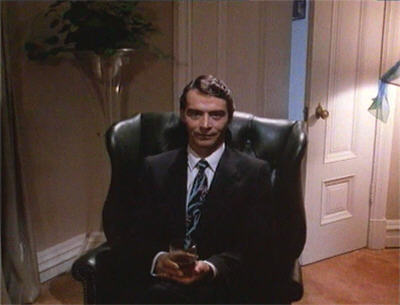
The attack on Dana is drawn out and upsetting, a joint assault by Pinhead and Blade—and in the face of some brave resistance, it needs both of them to take her down. At last, however, a crippled Dana is cornered in the elevator, where the gruesome death she foresaw in the vision experienced at the carnival is enacted…
With all of his friends dead, Alex is finally able to get some sleep—although not for long, as Megan comes knocking. This turns out to be yet another dream sequence, though one with an effective payoff as Megan leads Alex into the huge white colonnade ballroom of his unconscious, and to the masked figure of Neil Gallagher, which has been haunting him. It is hard not to feel indignant, however, when almost immediately Alex and Megan start enacting the same sequence for real; although not before he has a Godfather-esque, dream-within-a-dream glimpse of his dead friends…
This time around, Megan leads Alex, not to the ballroom, but to the diary of Andre Toulon. The passage she reads out to him describes Toulon’s bringing of his puppets to life. It also mentions that figures reanimated in such a way tend to take on the personality of their creator. Thus, while Toulon was in control, the puppets were safe enough; but should they fall into the wrong hands…
(Uh, wouldn’t it have been safer not to reanimate puppets with hooks for hands, or drills on their heads? Or not to design them that way in the first place? And seriously, what the hell’s up with Leech Woman!?)
Suddenly Alex has a vision—the ballroom again, and Neil Gallagher with Dana’s Pekingese on his knee, and Andre Toulon’s gun in his hand…


Alex hurries Megan away and, on the strength of yet another vision, into the dining-room—where the other three sit at the table, dead, each with a puppet nearby, and where they find a reanimated Neil Gallagher waiting for them…
An unbearably smug Gallagher explains to others his plan for living forever; although the smile is briefly wiped off his face when, in response to his insistence that for him, there is no end, Alex corrects him, “No natural end.” When Alex demands to know why he killed the others, Gallagher explains that, well, sooner or later one of them would have tuned in on what he, Neil, was up to; so of course he had to kill them.
(Note that he doesn’t bother killing Alex…)
And, after all, he had already killed Megan’s parents—and made them the subjects of his first human reanimation experiment—before marrying Megan to gain possession of the hotel, and to search for the secrets of Andre Toulon.
And with all that he has sought within his grasp—Gallagher announces that he is tired of experimenting with silly wooden puppets, and casts Jester roughly aside…
It is just possible that this was not the brightest idea he’s ever had.
A physical confrontation follows, with Gallagher knocking Megan to the floor and Alex trying to defend her—and getting the tar beaten out of him, although not without getting a few licks in himself. His attempt to escape with Megan is blocked by the sudden appearance of a poker-wielding Theresa—another of Gallagher’s human experiments, we presume—and a further beating for Alex follows.


It ends, however, with Neil Gallagher stumbling into the elevator—where the puppets trap him…
Earlier, Gallagher bragged to Alex that only “the total destruction of his body” could stop him, something the puppets seem to take as a personal challenge. The scene that follows, one punctuated by repeated snarls of, “What the hell do you think you’re doing!?” from Gallagher, who is evidently a slow learner, allows all of the puppets to take a swing at their erstwhile controller, and is consequently lengthy and more than a little grotesque—offering the viewer both the opportunity and ample time to wonder why Gallagher bleeds red from his legs but green from his fingers. This sequence also contains my favourite moment in the film, with Blade pausing after one particularly gruesome incident to clean up after himself…
The ending of Puppet Master is amusingly oblique, with Alex and Megan parting with a hug, and no reference at all to the questions that might be occupying the viewer’s mind, like, What happened to the puppets!? Sadly but probably inevitably, the screenplay eschews anything resembling an explanation for a kicker moment all but guaranteed, in spite of a couple of vague and unsupported hints, to elicit a blank, “Huh?”
I was glad about the dog, though.
Charles Band’s fledgling Full Moon was off to a flying start with Puppet Master, which was and remains an enormously popular film—to a degree which I confess I find rather baffling. Yes, the puppets are cool; very cool. Yes, there are some pretty good gore scenes. Yes, there’s a bit of skin, and occasionally a bit of humour. But there are also an awful lot of dead patches, some uninspired acting—and that ending.
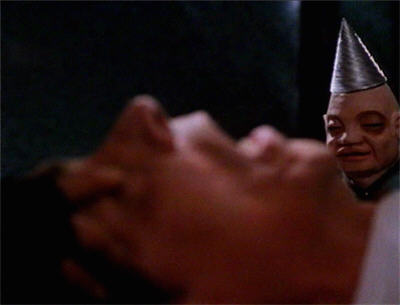
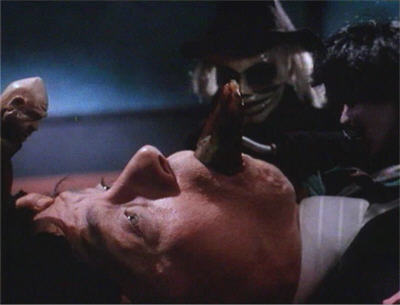
Still, my tepid response seems to place me in the minority, which no doubt explains the subsequent direction taken by Full Moon. Even as Puppet Master itself seems to have been inspired by the success of Child’s Play the year before, the positive reaction to this film not only resulted in a string of sequels but encouraged Charles Band & Co. to cannibalise themselves with one-offs like Blood Dolls, and even to come up with a copycat franchise, the Demonic Toys.
The thought that a market exists for so very many films about little scuttling things is both a bit bewildering, and rather heartening. I am left to assume that I was far from the only person to be traumatised at a tender age by a late-night screening of Trilogy Of Terror…

Leroy.

Dana is the only reason to even watch this movie. She is clearly the best character, however, unfortunately for her she lost control of her emotions and decided to hit the bottle too hard. This is my justification for why she didn’t freak out when Gallagher was sitting there…she was just so drunk there was no fear, no inhibition.
LikeLike
The only human reason. 😀
Ahem. If she was drunk, she wasn’t the only one…
LikeLike